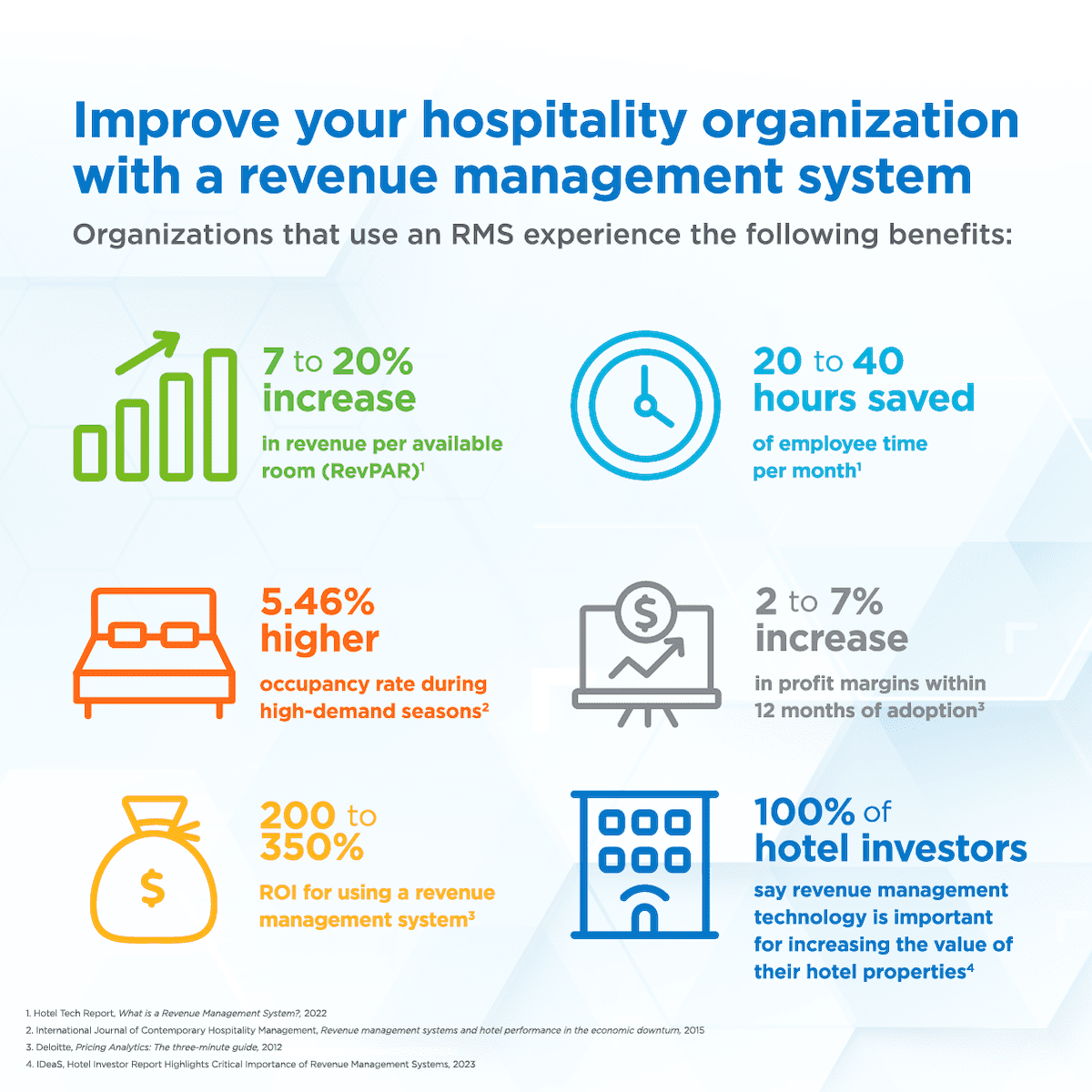Introduction
As a hospitality professional, you face some serious challenges.
Labor shortages, inflation, and a wobbly economic picture—these issues can lead to a deep sense of uncertainty. That uncertainty compels us to confront some equally serious questions:
- How do you create a budget effectively that accounts for uncertainty?
- How do you strategically manage prices based on fluctuating supply and demand?
- Where can you find the extra money in your budget to offset higher costs in labor and amenities?
- How can you maximize earnings with multiple revenue streams?
That’s a daunting list of questions for any one person or team to contend with. The good news? You’re not alone in facing them—and there are highly effective tools available to help solve these problems and more.
Here’s where a revenue management system (RMS) comes into the picture.
Whether you’re new to revenue management systems or a seasoned hospitality pro, this buyer’s guide will help walk you through some of the key considerations you’ll need to think through before making a purchase.
What is revenue management?
Let’s start with an introduction to the discipline of revenue management. The roots of revenue management can be traced back to the airline industry, but the fundamentals can be applied to nearly any business with a perishable inventory.
Perishable inventory is simply a product that can only be sold for a limited time before it is no longer available—like hotel rooms, event spaces, seat tickets and parking spaces.
Revenue management refers to the strategies used to maximize the value of this perishable inventory by ensuring the right price is offered to the right customers at the right time and through the right channels. This is in contrast to selling all inventory at the same price point on a first-come, first-serve basis with no regard for fluctuations in demand.
What is a revenue management system?
Simply put, an automated revenue management system is software that uses artificial intelligence (AI) to help hospitality professionals optimally price rooms, event spaces, and more. This is accomplished by processing vast sums of data related to factors like supply and demand, local events, and historical records.
Revenue management systems—like G3 from IDeaS—automatically consider all the circumstances that go into setting room prices on a given day. Once they consider the circumstances, these systems automatically set prices intended to maximize revenue.
“Having an automated RMS has really helped me strategize more. I can now quickly see the bigger picture and spend more time contributing to the things like marketing efforts and optimizing our online presence.”
What is the purpose of a revenue management system?
The purpose of a revenue management system (RMS) is to optimize pricing decisions and maximize revenue by analyzing demand patterns, market conditions and customer behavior. It helps with both forecasting demand and implementing dynamic pricing strategies.
Without RMS software, hoteliers seeking optimal pricing strategies are often stuck making reactive pricing changes based on gut feelings or are heavily dependent on vast, complicated spreadsheets that are labor intensive and prone to failure.
What are the benefits of a revenue management system?
The short answer? Revenue management systems help hospitality organizations make more money while saving valuable time for their strategic thinkers.
Revenue management software can benefit your property by quickly processing the key factors needed for developing a demand forecast. This forecast is then used to influence the critical room pricing decisions that drive revenue growth.
It’s not just useful for periods of projected high-demand, either—knowing the upcoming slow days allows you to make tactical sales, marketing and distribution changes that drive additional revenue.
Remember, while a full hotel is great, an RMS will help you take the steps needed to ensure that full hotel is occupied by the highest revenue-generating guests.

“The stress reduction alone—much less the monumental ADR growth and profit assistance—shows this is such a brilliant product.”
Who benefits from a revenue management system?
The benefits of a revenue management system can be felt across your hospitality organization. Businesses that use a revenue management tool experience 20 to 40 hours of time savings every month. That’s an additional 20 to 40 hours monthly that can now be used to think strategically, improve guest experiences, and generate new, creative ideas to help your organization thrive.
By helping hospitality organizations earn more money and save valuable time, automated revenue management systems benefit every member of the organizations they serve. However, not every person within a hospitality organization will directly use a revenue management system.
Key stakeholders of revenue management tools
Owners: For owners focused on quickly increasing asset value and driving the bottom line, revenue management systems help bolster their portfolio’s performance and optimize profitability.
Hotel executives: For hotel executives focused on improving operational efficiencies through an integrated technology stack, revenue management systems seamlessly integrate with your existing systems.
General managers: The broad responsibilities of a general manager often means their time is limited. Revenue management solutions can help by providing dependable—and automated—pricing decisions, freeing them to tend to the other important to-do’s that come with running a hotel.
Revenue managers: Revenue managers must be able to quickly gather, process and interpret demand-influencing data and make strategic decisions based upon their findings. With an RMS, they’ll spend less time manually dealing with complex spreadsheets and price distribution processes, and more time making the changes needed to maximize revenue.
“Once it all comes together, that is our success. It’s not just one tool or one person doing the pricing. Between G3, our residential manager and I, we essentially have three experts working together.”
What types of properties benefit most from revenue management software?
There’s clearly a wide variety of accommodations provided in the hospitality industry—so will an RMS actually benefit them all?
Whether your property is a sprawling luxury resort, an outdoor campground or something in between, a quality revenue management system can be configured to help you make the most of your inventory and other ancillary services on your property.
At IDeaS, we’ve developed successful integrations for the following types of accommodations providers:
Boutique & independent hotels: In addition to helping upper management save valuable time, automated revenue management systems provide boutique and independent hotels with the powerful analytical insights and comprehensive support that helps drive higher earnings.
Discover additional benefits ›
Economy hotels: Achieving high profitability and providing a memorable experience while operating on a thin budget presents a real challenge. But the right revenue management system can help economy hotels automate mundane tasks and boost revenue so that the razor-thin budget gets a little—or a lot—more to work with.
Discover additional benefits ›
Extended stay & serviced apartments: With travelers worldwide looking for more staycations, work-from-home destinations, and new cities to live in for short periods, extended stay and serviced apartments find themselves in an ideal position. Automated revenue management systems help these operations ride the wave of change and maximize revenue potential.
Discover additional benefits ›
Full-service hotels: Whether mid-scale or luxury, full-service hotels maximize overall profitability when they have a system for accepting the most profitable groups. That’s where automated revenue management systems can help by automating pricing, rate availability, and overbooking—all without anyone needing to pour over old spreadsheets.
Discover additional benefits ›
Outdoor accommodations: When compared to a luxury resort packed with amenities, these properties may seem to have relatively simple revenue management challenges—but looks are deceiving. Revenue management systems help outdoor accommodations providers face their unique set of challenges by providing accurate pricing forecasts, automating data-driven pricing and inventory decisions, and allowing greater configuration flexibility to ensure their often-unique accommodation options are optimally priced.
Discover additional benefits ›
Resorts & casino hotels: With digital transformation accelerating, resorts and casino hotels that use automated revenue systems can pull ahead of the competition by maximizing profits throughout the guest experience. Automated decisions generated through a revenue management system help resorts and casino hotels achieve the ideal business mix, enhance ancillary revenue, and exceed their profitability goals.
Discover additional benefits ›
“IDeaS G3 RMS stands out for its flexibility in adapting to market deviations, allowing us to align with current conditions. Additionally, the system’s ongoing optimization provided by the RMS ensures accurate rate decisions and forecasts that closely align to the final monthly numbers, all supporting ongoing operational and business planning.”
How to choose the best revenue management solution for your organization
As you can see, there are plenty of good reasons for seeking out the help of an RMS (or similar tools) for your property. The next critical phase in the buying process is identifying and evaluating the right tool for the job.
While finding the ideal mix of product features to meet your organization’s list of wants and needs may seem daunting initially, you can begin the process by identifying and evaluating some of the must-have foundational features. Let’s start with some of the key features that matter most.
What are the most important features to look for in a hotel revenue management tool?
Key Feature: Versatile, Automated Pricing
What’s the benefit? Automatically find the most profitable price point for complex room inventories even as conditions shift.
Whether demand fluctuates, business segments shift, or booking trends change, an automated revenue management system from IDeaS enables hotels to confidently adjust prices and remain competitive under any circumstance.
The best way to maximize revenue is to ensure you capture the right business at the right price. Our G3 solution includes features that can:
- Dynamically price products such as advanced purchase or loyalty discounted rate plans.
- Independently price by rate product (ex: bed and breakfast packages), room type, segment
- Optimally set price by length of stay
- Seamlessly factor in demand, guest willingness to pay, room-type hierarchy (ex: entry-level room types -> premium room types), and competitor influence
- Automatically manage rate availability, upgrades, and room overbooking.
When combined, these capabilities allow your property to accept the most valuable business while maximizing revenue from available inventory.
Key Feature: Responsive Analytics
What’s the benefit? Self-refining demand forecasts based on varied, relevant, and properly weighted data sources help you quickly adjust to market changes.
Powerful, effective forecasts provide a compass to navigate market changes and demand shifts. The predictive analytics in our G3 revenue management system factor in multiple data sources and historical data to understand pricing and demand patterns, length of stay, and booking behavior.
From there, G3 evaluates future on-the-books, booking pace, price sensitivity, market data, unconstrained demand, and prices by room type and/or market segment to ensure you drive the most profitable business to your property.
Key Feature: Manage by Exception
What’s the benefit? Reduce repetitive, tedious work and gain more time to focus on strategic initiatives.
A critical advantage of an advanced RMS is the ability to automate the routine work and focus your time on more complex matters. What does that look like with G3? No more manual rate updates in selling systems. No more time-consuming evaluations of competitor data and setting inventory and rate controls. No more spreadsheets. G3 automates these basic tactical activities, giving you more time to create revenue strategies and make decisions that drive long-term revenue.
If G3 identifies a situation you need to play a closer role in managing, it notifies you directly. In the meantime, G3 automatically manages your revenue strategy, giving you and your team the time to support other areas of your organization more directly.
Key Feature: Maximize Group Business
What’s the benefit? Empower sales teams with analytics and group pricing evaluation tools that help them maximize profits from group business events.
Thanks to its group pricing feature, G3 allows sales managers to quickly and efficiently decide whether a group event will make the hotel more money than if the hotel held the same rooms for transient business.
Once a hotel sales rep enters request for proposal (RFP) details into G3, the system considers ancillary spending to calculate the maximum profit potential for the group in question. Based on those findings, G3 can also tell sales teams the most profitable rates to charge. That’s an especially useful function considering that group business accounts for 40 to 60% of sleeping room business.
Group pricing also allows sales managers to upload room block patterns and critical details around concessions (such as complimentary rooms, commissions, and rebates) to obtain detailed and insightful displacement analyses. These analyses clearly show which revenue streams will generate the most profit.
Of course, these aren’t the only features that matter. To help in your evaluation of revenue management tools, we’ve created a helpful questionnaire for evaluating your revenue management solution options.
“I trust the system completely. I know I can let G3 RMS run on autopilot when needed and don’t have to constantly worry about the decisions it’s making,”
How much does a hotel RMS cost?
While you’re likely excited by the prospect of bringing the benefits of an RMS to your organization, it’s time to address reality and consider the price of an RMS. All the impressive features and benefits of a revenue management solution aren’t going to matter if the solution doesn’t make financial sense for your organization’s property.
Fortunately, the costs of an RMS will vary depending on the needs of your property. Common pricing factors include the number of rooms/units you have, the number of properties supported, and the specific features needed.
There’s a wide range of potential solutions and pricing—and we can help you find your most cost-effective option.
Why investing in an RMS is worth it
The benefits of an RMS are hard to deny—and it’s not just us saying it. Top hospitality professionals representing a huge variety of property types across the globe can all attest to this worthwhile investment.
- 83 percent of hotel investors describe the ROI of revenue management technology as “high” or “very high.” (IDeaS and Benchmark Research Partners survey of hotel investors)
- 30,000+ properties trust IDeaS with their revenue management solutions
- 99%+ of IDeaS clients choose to continue their business with us
“Implementing IDeaS turned out to be absolutely the best decision for us. Our revenue numbers have shown over 30 percent growth since implementation, and our average daily rate has jumped 40 points from where it was before.”
“We chose IDeaS due to their excellent reputation in revenue management along with their support, tangible results, and guaranteed growth. IDeaS cares as if our hotel is their own. They are hands-on, and we feel appreciated. You don’t feel you are a number. Now we aren’t just following the competition. We are leading it.”
“We have learned that the system is not just about pricing, it is also about forecasting, reporting, and channel management. IDeaS’ G3 RMS is a multifunctional tool and that makes it a really important tool for hoteliers to have.”
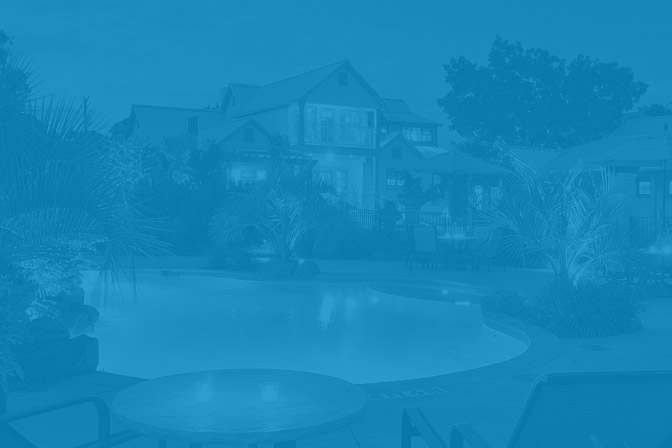
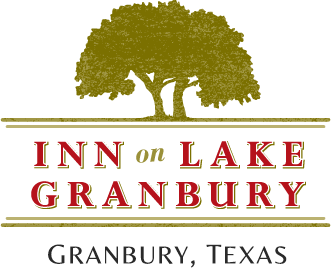
A Boutique Inn Dream Becomes a Reality (with a Little Help from Friends)
Inn on Lake Granbury
Read more
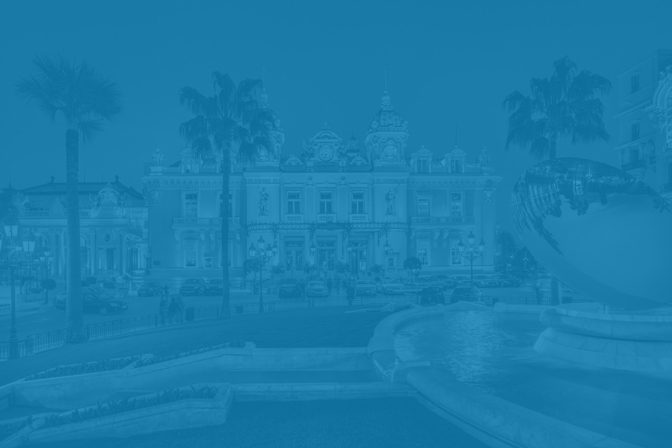

Independent French Hotel Chooses Multifunctional RMS from IDeaS
Monte Carlo - Société des Bains de Mer
Read more
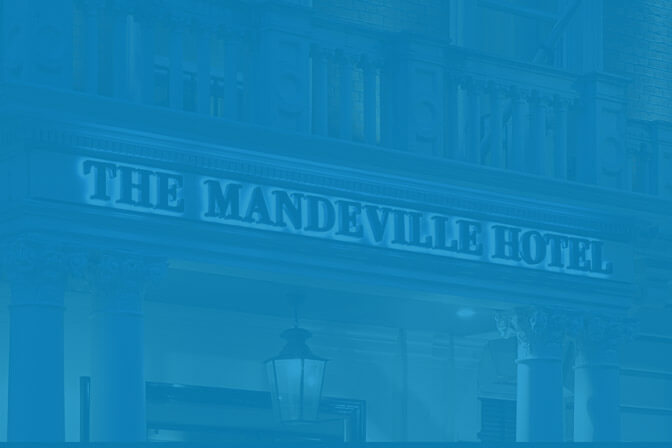
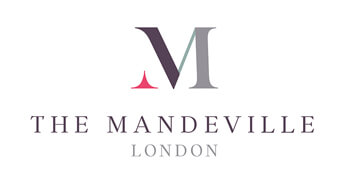
The Mandeville Hotel Experiences a Five Percent ADR Uplift with IDeaS G3 RMS
The Mandeville Hotel
Read more
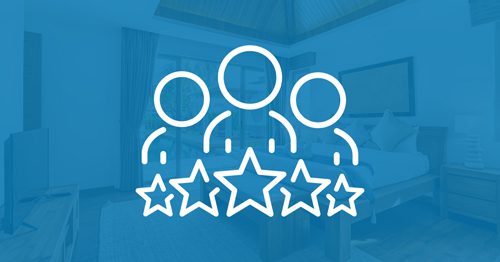
Explore more success stories
We help hospitality providers across the globe reach their revenue potential.
View more
Try our Revenue Uplift Calculator Tool
Building the business case for an RMS investment
Unless you’re fortunate enough to outright own a hotel, odds are you’ll need to build consensus within your organization to make this important of an investment.
That’s not always an easy task, even if the investment appears to be an obvious winner. Building a business case is a skill, but it’s also one we can help you with by breaking the process down, step-by-step.
For more, see our blog: 12 Essential Steps for Pitching a Revenue Management System to Your Colleagues.
What’s the best revenue management software solution for you?
Investing in a revenue management solution is an important decision that requires careful consideration of product features, benefits, costs and more. While doing your homework and researching your options will take some effort, you should know by now that this decision can have a profoundly positive impact on your hotel or property’s bottom line—and that we can help you as you weigh your options.
